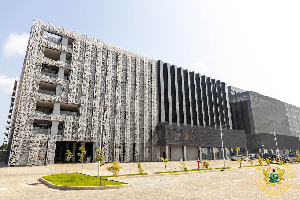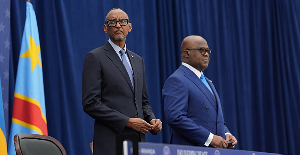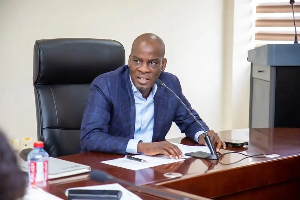By Maxwell Oteng
California, USA, March 31, 2009
I must confess that I really don’t know much about President Mills’ cabinet choices to have an informed opinion of their competences or lack thereof. This is because like many things in Ghana, information about the background of most of these choices is disturbingly opaque. I wonder why, for such important responsibilities as ministerial and deputy-ministerial appointments that effectively determine those who would steer the affairs of the country in given a political cycle, the background information of the experiences and core competences of the appointees is not put in the public domain for our collective perusal. From the snippets of information obtained from the parliamentary "vetting" process – an exercise that has effectively become a mind candy - I must say that some members Mills cabinet don’t inspire confidence at all. I hope I'm dead wrong for the sake of Ghana. I’m ROOTING for Mills government to succeed. But I digress.
The vetting process (notwithstanding all the theatrical sideshows), particularly the brouhaha that engulfed the vetting of Mr. Fiifi Kwetey and the debate and pseudo-debates that have been taking place on Ghana-related online discussion forums about the skills and experiences of President Mills’ cabinet offer a window into our collective mind about how we think about the de rigueur qualifications of a prospective political appointee. During the vetting of Fiifi Kwetey, out of curiosity and because I didn’t know anything about him, I asked, in a discussion thread, about what made him qualify to be a deputy Finance Minister of Ghana. Not surprisingly, the answer volunteered by a contributor to that discussion thread called “Constant” chose to highlight his “superior IQ”: “First class in Economics from Legon. A-levels at Achimota (3 A's and B in Gen. Paper, Nov/Dec '88; 2 A's ... June '89). O-levels at Bishop Herman (distinction). Similar comments have been made elsewhere in related debates. For instance one Tina commented on www.myjoyonline.com that “Fiifi will do well as a minister. He is more than qualified. At least he has certificates to show..” So it looks like Fiifi Kwetey is the “superman with super IQ” that Ghanaians have been waiting for to save the economy. But he is going to need more than that!
However, the academic achievements of individual appointees are of little interest to me, even though for the sake of the future of our beloved country, I sincerely hope the Fiifis who have been appointed by the president would bring their entire intellectual faculty to bear on their new responsibilities to progressively move Ghana’s development pursuits forward. What is of significant interest to me – and it’s the central import of this article – is that in debate about what makes one qualify to be a minister or deputy minister of state, some Ghanaians tend to put a higher premium of intellectual/academic intelligence - what I prefer to call “classroom” intelligence - than on any other form of intelligences or experiences. I refer to intellectual intelligence as “classroom intelligence” in the context of Ghana because people who have not been fortunate to be formally educated and thusly cannot demonstrate their analytical intelligence in English are automatically eliminated from any considerations for ministerial appointments. As some one with multiple academic degrees, I celebrate achievements. Unlike a certain group in our society that has such disdain for the intelligentsia, I don’t see any conflict between thought and action. In fact I appreciate intellectual power and I would rather our political leaders have and surround themselves with the necessary intellectual power. But intellectual power alone is not sufficient to make an effective leader.
Intellectual/classroom intelligence is by and large in our genes, reinforced by our classroom experiences and measured by Intelligence Quotient (IQ) tests or other forms of convergence tests such as the “Ordinary” level and “Advanced” level tests that were nearly aced by Mr. Fiifi Kwetey. Unfortunately, in Ghana there is a tendency to mistakenly equate intellectual/academic intelligence with eloquence (linguistic intelligence) even though eloquence is only a small part of the whole panoply of human intelligence. Ghanaians tend to look at intelligence from a very narrow prism. Human intelligence, in its totality, is all-encompassing and has a very broad reach.
For instance psychologist Robert Sternberg categorizes intelligence into three parts in his triarchic theory of intelligence. These are
• Analytical intelligence, the ability to complete academic, problem-solving tasks, such as those used in traditional intelligence tests. These types of tasks usually present well-defined problems that have only a single correct answer.
• Creative or synthetic intelligence, the ability to successfully deal with new and unusual situations by drawing on existing knowledge and skills. Individuals high in creative intelligence may give 'wrong' answers because they see things from a different perspective.
• Practical intelligence, the ability to adapt to everyday life by drawing on existing knowledge and skills. It enables an individual to understand what needs to be done in a specific setting and then do it. In effect, practical intelligence involves knowing what to say to whom, knowing when to say it and knowing how to say it for maximum effect.
Another psychologist, Howard Gardner, goes even further to discuss nine types of intelligence in his theory of multiple intelligences. For the purpose of this article, I dwell on five of these intelligences, namely, logical-mathematical intelligence, interpersonal intelligence, intra-personal intelligence, verbal-linguistic Intelligence, and visual-spatial intelligence (if you are interested you can read more about them and the rest at www.howardgardner.com). Here is how Gardner describes these intelligences:
• Logical-Mathematical Intelligence defines one’s quantitative ability. It enables us to perceive relationships and connections and to use abstract, symbolic thought, sequential reasoning skills, and inductive and deductive thinking patterns.
• Interpersonal Intelligence is the ability to understand and interact effectively with others through verbal and nonverbal communication. It involves the ability to recognize differences among others, the display of sensitivity to the temperaments of others, and the ability to entertain multiple perspectives. People with this kind of intelligence tend to be leaders among their peers.
• Verbal-Linguistic Intelligence is the ability to think in words and to use language to express and appreciate complex meanings. This type of intelligence is the most widely shared human competence.
• Intra-personal Intelligence reflects the capacity to understand oneself and one’s thoughts and feelings. It involves not only an appreciation of the self, but also of the human condition. This intelligence provides the drive for self-motivation.
• Visual-Spatial Intelligence is the ability to think in three dimensions. Core capacities include mental imagery, spatial reasoning, image manipulation, graphic and artistic skills, and an active imagination.
In recent times, psychologists such as Daniel Goleman, John D. Mayer and Peter Salovey have argued that emotional intelligence may matter more than IQ in dealing with difficult situations. Emotional intelligence involves a person's ability to understand and manage their own emotions, the emotions of others or the emotions of groups and to act appropriately based on this understanding.
So instead of being obsessively concerned about the academic intelligence in the selection of our political leaders, we should broaden our intelligence criteria. Success in leadership, in business and in life in general depends not only on analytical intelligence, but also on other forms of intelligences, particularly practical intelligence and emotional intelligence. We should expect our prospective political leaders to have these five types of intelligences: analytic/intellectual intelligence, inter-personal intelligence, intra-personal intelligence, creative/spatial intelligence and emotional intelligence. These intelligences are not necessarily mutually exclusive, but they are necessarily orthogonal to each other. In other words, the presence of one of them doesn’t impede the presence of the others, but the presence of one doesn’t imply the presence of others. We should not rely on convergence tests (IQ tests) alone but also on divergent tests (tests that elicit imagination, creativity and vision) to question the suitability of any individual for a political appointment. This is the only way we can break the albatross of mediocrity that has been hanging around the neck of our political leadership for so long
Opinions of Monday, 6 April 2009
Columnist: Oteng, Maxwell
The “Intelligence” Of Our Political Leaders
Entertainment













